Save those citrus peels to make beautiful extract! Homemade lemon extract takes on a gorgeous natural yellow hue and smells fabulous! This is not only great for your pantry but also makes a thoughtful homemade gift.
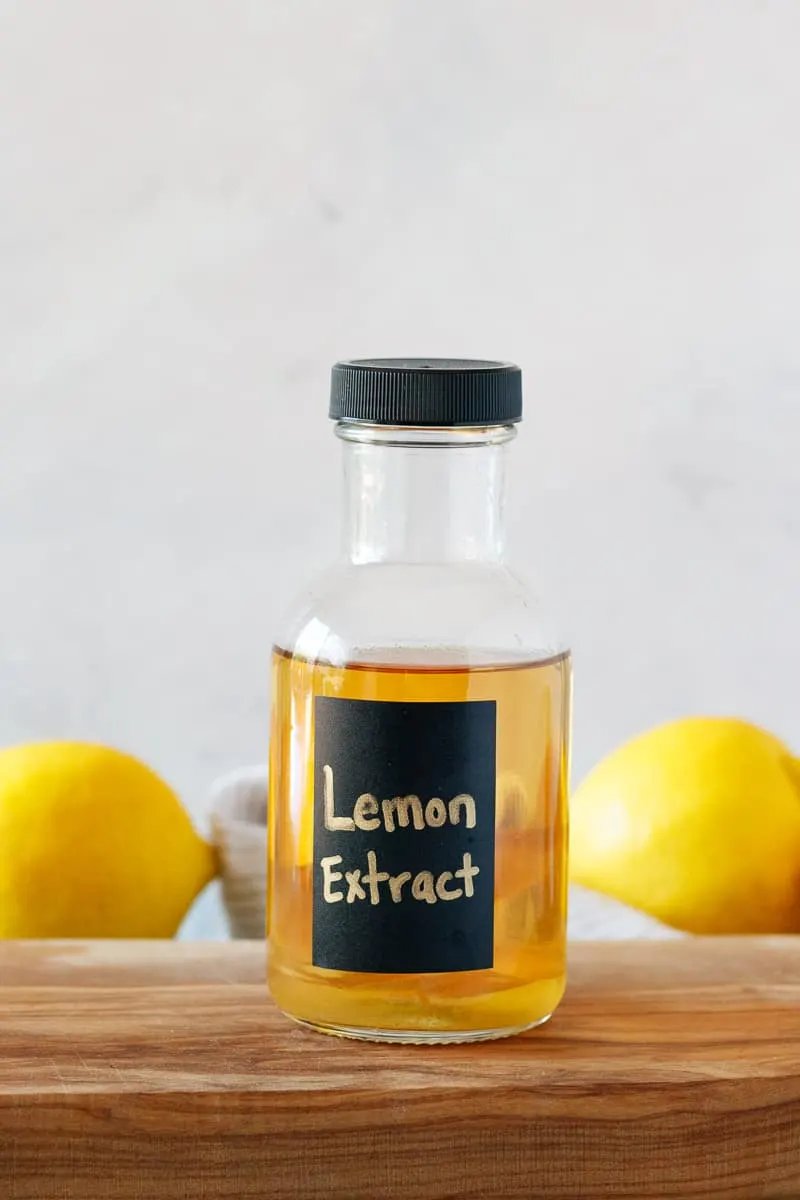
Raise your hand if you love lemon! *me me me* Darlings, I am a huge fan of citrus desserts, especially in the winter months when citrus is in season. But how do we keep that amazing flavor all year round? We make lemon extract! It only takes a few minutes of preparation to start, and a little time to finish. Easy peasy, lemon squeezy as my oldest says. Let’s get started!
What kind of lemons do I need to make the lemon extract?
Any kind of lemon will work. In stores, you’ll typically find one of three varieties: Lisbon, Eureka, and Bearss. These are what most of us think of when we think of lemons. Seasonally, you’ll also find Meyer lemons, which are actually a hybrid lemon, and sweeter. This article has a good breakdown of the differences in the lemon varieties.
The extract in the picture actually started as a Meyer lemon extract. I had to find a way to enjoy the few lemons I had a little longer once they disappeared at the store. Eventually though, it became a standard lemon extract because I wanted to make a little more, so I used standard lemon peels. Instead of keeping 2 extract jars in my tiny pantry, I mixed them. Absolutely still the best lemon extract I’ve had. It’s my “special occasion” lemon extract, haha.
Any of these lemon varieties will work for making lemon extract, all you need is the zest from the peel!
How do I prepare the lemons?
Get your peelers ready! A good peeler is the only tool you’ll need to make this! A good time to start any citrus extract is when you are batch juicing for freezing. What you need to do is carefully remove as much of the peel as possible, trying to get as little of the white part as you can. This is where the peeler comes in handy. Although if you’re good with a paring knife, that can work too.
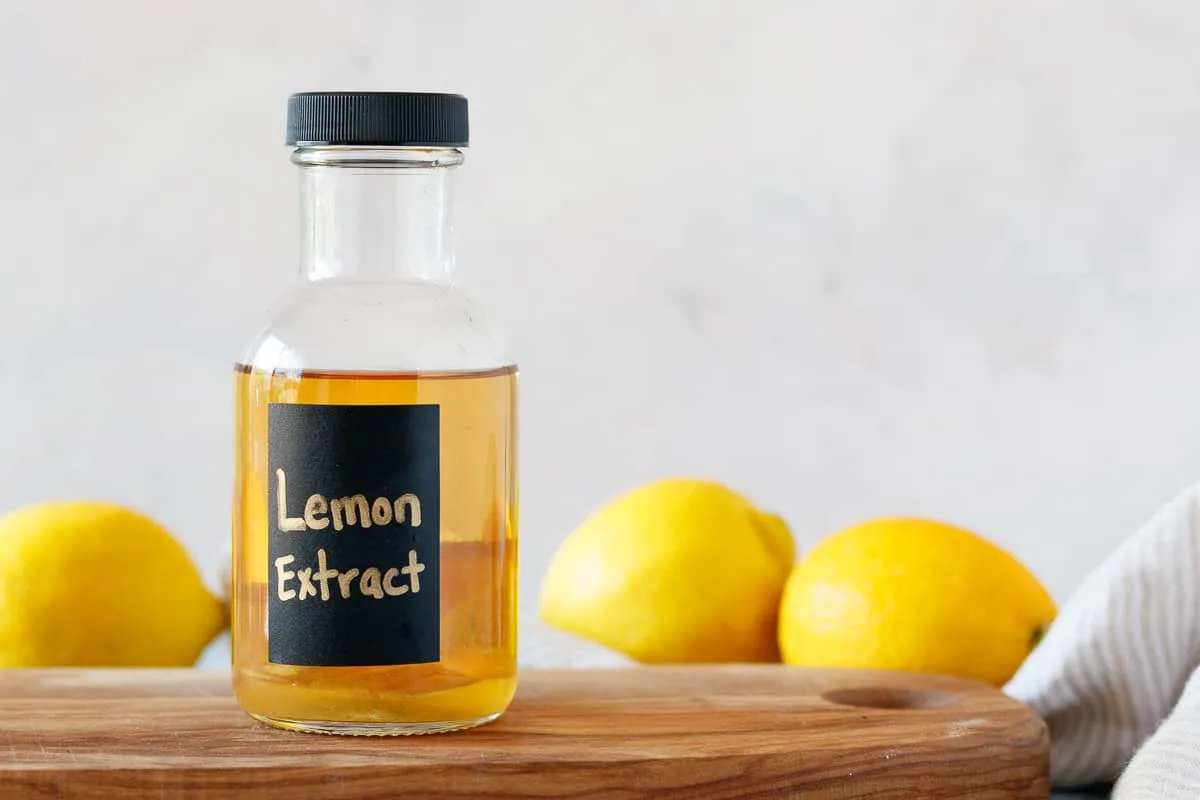
You need to try to avoid getting a lot of the white portion of the peel, or pith, because it’s bitter. And just like you wouldn’t want to include it in the zest for something like cookies, you definitely don’t want it in your extract. A tiny bit is fine, and unavoidable, of course.
Since at some point you also need to strain the zest from the extract, cutting your zest in strips makes this easy. If you use a grater, you have to strain through a cheesecloth and it’s all kind of a mess. Stick to strips of zest.
Additionally, if you can find them, it’s good to try and use organic lemons. Citrus peels carry residual pesticides, and if you’re trying to extract what’s in the peel, you may end up extracting a few things you didn’t want. So if they are available in your area, I’d recommend picking up a few organic lemons for this recipe.
Will this work with other kinds of citrus?
Absolutely! Lemon isn’t the only citrus out there that we use in baking, darlings! You can use exactly the same process for making lime extract, grapefruit extract, and orange extract! If you want to test, just make a small jar to start. That’s the great thing about extract making!
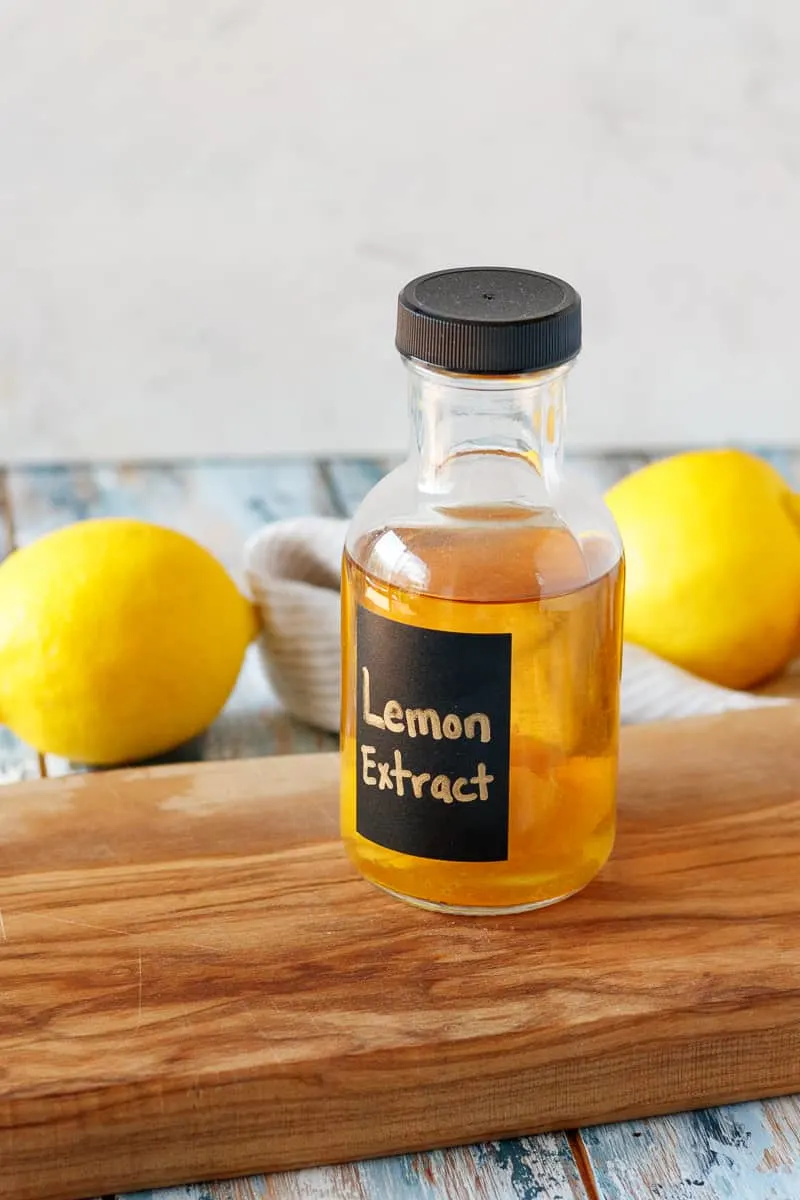
I hope you love this recipe tutorial! If you haven’t already, be sure to check out my posts on how to make vanilla extract and how to make a cinnamon extract ( a new fav!). Enjoy!
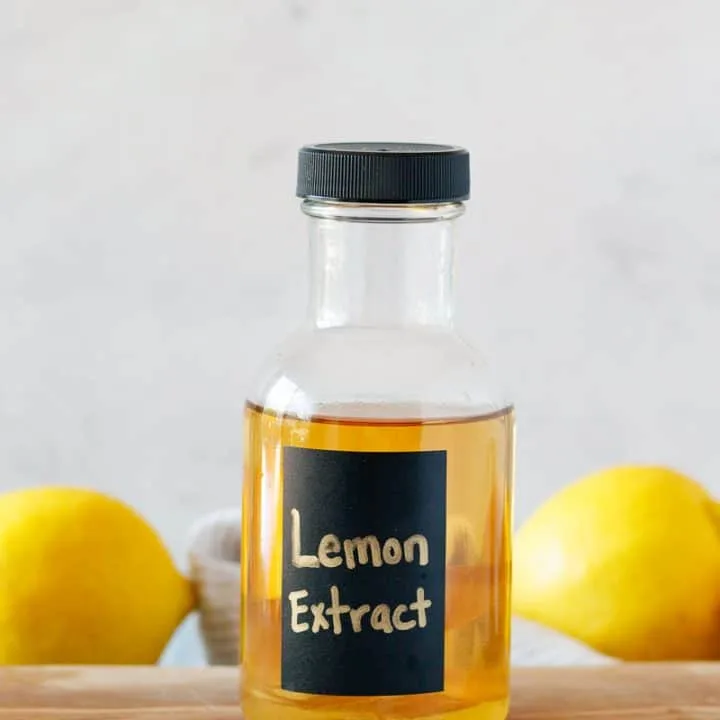
Homemade Lemon Extract
Save those citrus peels to make beautiful extract! Homemade lemon extract takes on a gorgeous natural yellow hue and smells fabulous! This is not only great for your pantry but also makes a thoughtful homemade gift.
Ingredients
- 2 cups vodka, unflavored
- zest from 4-6 lemons
Instructions
- Make sure your extract jar is clean and dry.
- Using a peeler, carefully remove as much of the zest as possible. Do your best to avoid the white portion of the peel. A little bit is okay.
- Place all the lemon in your jar. You want the jar to be at least 2/3 full with peels if possible, so the exact number of lemons needed will vary.
- Pour in your vodka, making sure that the peels are completely submerged. Cover your jar and place in a pantry.
- Allow the jar to rest 4-6 weeks, shaking once a week or so if you'd like, until the extract has a nice potent flavor. Depending on the potency of your lemons, it can be ready in as little as 4 weeks, or as long as 8 weeks.
- Transfer your extract to a clean jar for storage, removing all the zest. That way your extract doesn't become bitter.
- Homemade lemon extract is good for at least a year. Enjoy!
Recommended Products
As an Amazon Associate and member of other affiliate programs, I earn from qualifying purchases.


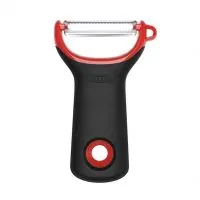


Susan Doyle
Wednesday 30th of December 2020
I forgot all about my lemon extract sitting in my closet! I was going to give it for christmas gifts. Eight months later I see it and fear it is ruined. I didn't shake it at all! I tasted it and think it's fine but certainly can't give it to others if its tainted. What do you think? Thank you for whatever information you can share. Susan Doyle
Mary (The Goodie Godmother)
Sunday 24th of January 2021
If it doesn't smell off, it should be okay. Check for any discoloration on the lemon or signs of mold on the bottle. If it smells fine and looks okay, I would test a little in a batch of cookies or something to make sure it didn't turn bitter. If the cookies turn out great, then I think you're fine!